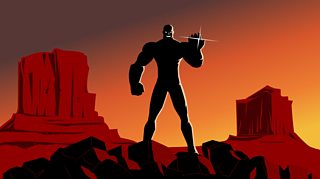Why do we hold grudges and can they ever be good for us?
Professional wrestlers Drew and Lee have been like brothers ever since adolescence. When one betrays the other in the heat of a tumultuous night in Glasgow, the two men find themselves entangled in a bitter grudge that goes way beyond the confines of the wrestling ring, with violence and bitterness spilling over into the real world…
In Radio 4's Sideways – the podcast about the ideas that shape our lives – Matthew Syed delves into the world of pro wrestling to shed light on the hidden values and harsh consequences of grudges.
Can grudges ever be beneficial? Or will they always be destructive?
“The core of the friendship was our love of wrestling.”
Lee and Drew’s friendship started aged 16 and 17, with suplexes, neckbreakers and powerslams. Every week, the friends would watch their WWE (World Wrestling Entertainment) idols on the big stage, and dream of one day stepping into the ring themselves.
“The core of the friendship was our love of wrestling,” says Drew.
After a few months of training, Lee Greig became "Jack Jester". Drew kept his real name, Drew Galloway. And the two friends started to get their first wrestling gigs across the UK.
“Some of the shows back then were grim, really grim,” says Lee. “I’ve wrestled in car parks where you’re making your entrance at the back of a van.”
Then in 2007, after years of hard work, Drew was asked to sign with the all-powerful WWE. The two pals were elated. Drew Galloway became "Drew McIntyre".

“He attacked me and picked me up and threw me off the stage.”
Drew stayed with the WWE for seven years, trying to make a name for himself. But in 2014, he was released. Not ready to abandon his passion, he returned to Scotland and joined Lee at ICW – Insane Championship Wrestling. It was a return that remained a secret until 27 July 2014.
Grudges can be bitter and personally detrimental. They can eat us up inside. But what if that energy can be harnessed positively?
That night, Jack Jester was fighting two members of a tag team, and not faring well. Then, in a shocking twist, Drew entered the ring. The stunned crowd presumed he was coming to Lee’s rescue. But Drew picked his friend up – and threw him off the stage.
It was an act – part of the vaudeville of pro-wrestling. And yet Lee found himself dealing with conflicting emotions that would soon turn the fake grudge into a real one.
“I was the champion,” recalls Lee. “Drew came back and got this huge reaction, which was what we all wanted. And I remember lying there and there was folk chanting for him. I’d never thought about me lying on the floor after being jumped and folk still chanting his name.”
“That broke my heart,” he says. “I was holding a real grudge about it.”
The short-term versus the long-term grudge
As Matthew Syed explains, “Grudges can be bitter and personally detrimental. They can eat us up inside. But what if that energy can be harnessed positively? Grudges can be used as motivational fuel – we see it in sport all the time. A feud can give us the push we need to succeed.”
But they can also be viciously self-defeating.
There are short-term grudges and long-term grudges, explains Professor Robert Enright from the University of Wisconsin. A short-term grudge can be empowering: it shows you that you “have standards of right and wrong” and respect for yourself.
But held too long, a grudge can become harmful. “We have to be careful that we don’t become so enamoured of that grudge, that we take it into our heart and say, I want this as part of my identity,” explains the psychologist and expert in forgiveness. “That can make us anxious; it can make us depressed.”
“We were so immersed in it at this point, that nothing was fake about it.”
Lee and Drew’s feud reached long-term grudge status. The boundaries between theatre and reality blurred. And it began to get personal.
“Drew was being interviewed live, in a venue in Glasgow, and I crashed it,” Lee recounts. Already unwelcome, he then made a comment about Drew’s dad.
“I went for him and he ended up bleeding all over the place,” explains Drew. “I knocked the promoter through a glass table, because I just lost my head.” He threw a pint glass at Lee’s head, splitting it open.
“We were so immersed in it at this point, that nothing was fake about it whatsoever,” says Lee.
Both men acknowledge that things went too far. “We risked a friendship for one match,” states Lee.

"He looks heartbroken..."
The moment Drew threw Lee out of the ring and their long-running grudge started.
Drew and Lee had opportunities to resolve their "disagreements" during the three years following the infamous betrayal in Glasgow. They even briefly paused their feud to team up in tag team matches. However, on a personal level, they remained entangled in an unresolved conflict.
Forgive does not mean to ignore the grudge, it means to react to the person with a wider angle lens.Prof. Enright
In April 2017, Drew and Lee decided to settle their differences once and for all. The showdown occurred at the Insane Championship Wrestling event, "Barramania 3" at the famed Barrowland venue in Glasgow. But this wasn’t your typical wrestling match — it was a barbed wire match.
“This is real. You could use fake barbed-wire but what’s the point?”
The ongoing grudge between the two men had drawn so much attention that the WWE called Drew to offer him another chance. But before that, he had to face one last fight.
“I remember being nervous that day,” says Lee. “At any point in wrestling something could go wrong but when you add barbed wire into that, that’s when the risk starts to really play on your mind.”
Drew got the upper hand. “I don’t think anyone was in the audience wishing they were me that night,” recalls Lee. “I left that match in a complete mess.”
The match was over. The grudge was officially settled, at least in the ring. But true reconciliation lay beyond the ropes.
Lee waited for Drew through the curtain and the first thing he said to his old friend was, “Pint?” They went to the bar to defuse things. “I think deep down we both knew within ourselves, we’ll get through this,” he says.
"We had a great night”, Drew recalls, “and were able to reconnect again and kind of laugh about all the horrible things we’d done to each other.”
Drew McIntyre is now one of the WWE’s biggest superstars, winning the World Champion's belt twice in 2020. Lee Greig, as Jack Jester, recently became the Insane Championship Wrestling champion in Scotland. And the two men are friends once more.
The importance of finding space for forgiveness
Matthew reflects, “Grudges are fascinating. The narrative of revenge and the satisfaction of seeing justice served can captivate us in real life, or in entertainment. But they can be damaging.”
A 2014 study, led by Professor Zhang from the Rotterdam School of Management, found that people actually feel the weight of a grudge, physically (and that the act of forgiveness will literally lighten that load). Dig our heels in for too long and it might not be the other person who pays, but ourselves.
For nearly three decades Professor Enwright has worked on the moral development of forgiveness: “Forgive does not mean to ignore the grudge, it means to react to the person with a wider angle lens.”
When a grudge is coming your way, Professor Enwright advises us to take time to consider the possible outcomes: “Will you get more out of the quest for justice with a softened heart than you would if you have a hate-filled heart?”
Matthew explains how Lee and Drew’s story teaches us the importance of boundaries: “The key lies in finding a balance between acknowledging our legitimate grievances while allowing the space for true forgiveness. That’s when we don’t allow grudges to turn into that poison, that burdening resentment that can weigh us down so badly.”
-
![]()
Listen to Sideways: Grudge Match
Matthew Syed questions both the hidden values and harsh consequences of grudges. Featuring WWE superstar Drew McIntyre, ICW champion and professional wrestler Lee Greig, Prof Robert Enright from the University of Wisconsin and writer Sophie Hannah.

More from Sideways
-
![]()
Listen to Perfectly Mediocre
They say practice makes perfect, but is perfection really what we should be aiming for?
-
![]()
Why are our first loves so unforgettable?
Matthew Syed finds out why our first loves can hold a special place in our hearts.
-
![]()
Listen to Copy Cat
Matthew Syed hears from a painter who rose to fame by copying the works of others.
-
![]()
Is it time to embrace your inner villain?
Do you think you're too nice and could it be holding you back?





